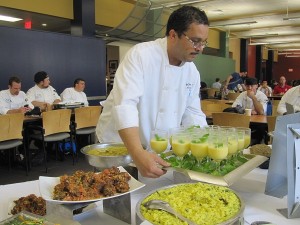I had believed that social change came from the world of nonprofits. How could do-gooders both stay true to their vision and make money? Didn’t that take grants and volunteers and 501c3 status? It was exciting to see true sustainability at work: a for-profit business model that was also loyal to a socially responsible mission. From then on, I knew I wanted to work for Bon Appétit.

Blog: News
+ Blog Categories

Bon Appétit’s Campuses Win More Recognition
Making healthy choices often seems tough for college students. Between social activities, doing homework, and participating in extracurricular, personal well-being can often take a back seat. But Bon Appétit makes the healthy choice the easy, default choice in the dining hall and we were recently recognized for our efforts.
CNBC Calls Bon Appétit Management Company “Silicon Valley’s Hottest Player”
CNBC interviewed Bon Appétit Management Company CEO Fedele Bauccio about what it’s been like feeding Silicon Valley for 25 years.

Lessons Learned on the Turmeric Trail
- Blog
This summer, Bon Appétit chefs gathered around the country to learn the ins and outs of cooking authentic Indian cuisine. At Emmanuel College in Boston, I joined a group of New England chefs attending the culinary training, titled “Flavors from the Turmeric Trail” and given by Raghavan Iyer, a native of Mumbai and a celebrated chef, author, and teacher.
Bon Appétit Makes Top 10 List from Her Campus
- Blog
When it comes to food, students know what they like – and what they don’t. Long gone are the times where students would eat mystery meat, things covered in gravy, and canned vegetables. Thanks to Bon Appétit, they don’t have to.

The real question about local food
- Blog
“Which is better for the environment and the economy — a tomato grown nearby or one from the supermarket?” That’s how USA Today starts off a recent piece titled “Local food is trendy, but is it really more eco-friendly?,” discussing two new books that claim to debunk the idea that it is. This argument is a pretty moldy one — it’s been floating around since we launched the Eat Local Challenge, back in 2005 — and it surprises me that anyone still likes to take a bite of it.
Last Chance to Ask FDA to Regulate Antibiotics
- Blog
Among its many firsts, Bon Appétit Management Company was the first food service company to address the issue of antibiotic overuse in the meat supply. We don’t serve chicken, turkey, or hamburgers from animals that have been raised with the routine use of antibiotics in their feed or water, which is the default for most of the poultry, hog, and beef industries. CEO Fedele Bauccio, who served on the Pew Commission for Industrial Farm Animal Production, has several times briefed Congress and Capitol Hill staffers on why it’s urgent that the government safeguard these drugs that were developed to treat human illness. Yesterday, the Food and Environment Reporting Network‘s Maryn McKenna broke the story on ABC News that more than 8 million American women are at risk of recurrent bladder infections because of the overuse of antibiotics in animal agriculture. McKenna wrote […]
The Story of Bon Appétit
- Blog
Bon Appétit Management Company was founded in 1987, by two food service industry veterans — CEO Fedele Bauccio and President Ernie Collins, later joined by COO Michael Bauccio — who had a vision of different kind of company. They set out to bring restaurant-quality food to corporations, universities, and specialty venues. Bon Appétit has become an industry pioneer in many other ways: the first to commit to local food, sustainable seafood, and cage-free eggs, and the first to tackled thorny issues such as food’s role in climate change, the reduction of antibiotics in agriculture, and farmworker rights. To celebrate our 25th anniversary, we worked with a great team at InHouse Creative Services to make this video about how we got here, and where we want to go next: The Story of Bon Appétit Management Company from Bon Appétit Management Company […]

BAMCO CEO Joins Food Movement Leaders in Demanding Healthy Food and Farm Bill
Bon Appétit Management Company CEO Fedele Bauccio is proud to be among the 70 leading chefs, authors, food policy experts, nutritionists, CEOs, and environment and health organizations that have today sent an open letter to Congress urging lawmakers to revise the draft of the 2012 Farm Bill — which should more properly called the Food Bill, as it is the largest and most significant piece of legislation affecting what, how, and even whether Americans eat.

Thomas Keller Has a Responsibility — to Set the Record Straight
I was surprised and disheartened to read comments by Thomas Keller in the New York Times that chefs’ only responsibility is to taste. “Is global food policy truly our responsibility, or in our control?” Keller asks. “I don’t think so.” I disagree, as do many others, and I am hoping that Keller’s statements were taken out of context. Chefs have an enormous power to make a difference, and they can do so without sacrificing flavor.
